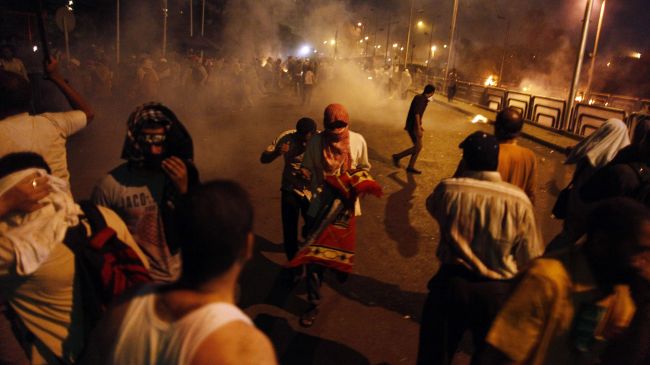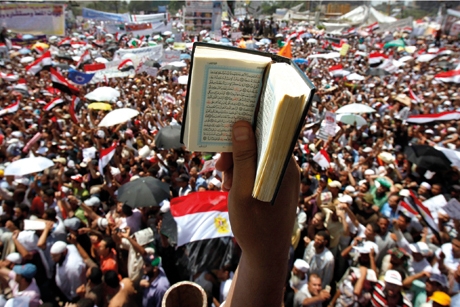Time of risks and contradictions
TWO YEARS AGO, to the surprise of many, I took a position of “cautious optimism” when the Arab masses surged into the streets, from Tunis to Cairo, and from Benghazi to Damascus and Sanaa. The dominant “political” analysis of these events, which explained them primarily by domestic factors, has proven to be a major error and every passing day confirms—unfortunately—the accuracy of my first assessment. Now, seen in the harsh light of pervasive internal tensions, the “Arab revolutions” have stalled; the regional “spring” is little more than an illusion. More time will have to pass, of course; the outcome cannot be predicted. But one thing is clear: the entire MENA (Middle East and North Africa) region has never been so weak, so vulnerable and so destabilized in the last thirty years. Political instability is reflected in the crisis of national economies ravaged by corruption, debt, unemployment and pauperization. What does the future hold for the Mid-East? What will become of its peoples; what will be the fate of the Palestinians?
Egypt is in the throes of a profound crisis; the situation is critical. To neutralize the power of the armed forces and the judiciary, which prevented him from applying his policies, and even thrown his own status into doubt by calling for new elections, President Mohamed Morsi preemptively assumed “temporary” powers that curiously recall former President Mubarak’s singular prerogatives. True enough; the opposition parties, combined with institutional interference at every level, had made governing all but impossible. We will soon see whether the president’s measures are indeed “temporary,” and designed to speed up the democratic transition, or a return to dictatorship. Whatever the outcome, Egypt appears fragile, with little room to maneuver. In medical terms, the country is in intensive care, its survival at stake, its economy asphyxiated, unable to produce a vision for the future.
Tunisia is little different. Hopes for freedom, and for an intelligent alliance of open-minded secularists and reformist Islamists, had been high. But the blows dealt by hard-line, and even extremist factions, have hit hard. Racing against the clock, the government gambled and lost; all indicators point to its defeat in the event of early elections. Popular impatience is understandable, but it may well open the door to populists on both sides. Secular fundamentalists, like the literalist Salafis and the Jihadists, are doing everything they can to destabilize the government, destabilizing the entire country as they do. The government twists and turns with every shift in the ideological wind. No single force is capable of devising an economic and social policy that would ease the crisis.
While Tunisia depends on handouts, Libya is torn by clan and tribal strife; only its oil industry has been secured for the greater benefit of American, French and British interests. A brutal conflict wracks Syria; mass demonstrations in Jordan shake the power of the monarchy. Yemen is at a dead-end, while Lebanon is dangerously divided and Iran has been weakened by international sanctions.
International political alliances are now analyzed through the prism of the Sunnite-Shiite rift. What was once the “Arab spring” is now a season of endemic weakness compounded by political instability, an absence of economic vision, the inability of regional actors to work together, sectarian divisions. The road to democracy is strewn with obstacles, pitfalls and new dependence. And at the heart of the Mid-East, Israel continues to act with impunity, solves its internal political crises by attacking Gaza, and reaps the benefits by accepting a truce concluded under Egyptian auspices. On the ground, its opponents’ weakness allows it to play for time and to continue the slow colonization of Jerusalem and parts of the Occupied Territories. The cynical recognition of a new, curious status for Palestine at the United Nations (a “non-member” and an “observer” (of its own disappearance?) adds a note of hypocrisy and humiliation to a modern-day tragedy. The Arab false spring is a Palestinian winter, as Israel clearly reaps the short-term benefit.
Today’s period of transition is a time of heightened risks, and of sharp contradictions. Time is needed, but time is lacking. A dynamic joint regional architecture must replace national—and nationalist—policies. The multiple crises that envelop the MENA countries generate internal division. Only a policy of reconciliation and greater unity among political parties, political actors and economic agents can lift the regional countries out of their current chaos and instability.
The peoples must be alert, analytically and democratically. Populist movements are gaining strength, forcing emotional, hasty, binary and often blind reactions. Political and religious leaders, intellectuals and students, women (in the heart of their legitimate struggles) as well as ordinary citizens bear a heavy responsibility. They must become the masters of their fate. If democratization is to mean anything at all, it must be in terms of freedom and responsibility. Time has come to stop blaming the West, the neighboring countries, and the “powers” for the crises they continue to suffer.
The Great Powers undoubtedly played a role bin the uprisings; they continue to wield great influence, and have not stopped promoting their interests, dictatorships or not, democracy or not. Engaged as they are in a painful transition, the MENA countries must now face their destiny. But beyond the strategic planning of the Great Powers—both the Western countries and the BRICs (Brazil, Russia, India, China)—these countries have a historic opportunity to take their destinies in hand; to create a new regional balance of power, new ways of handling the religious reference. They can profit from the emerging multi-polar economic order to celebrate cultural and artistic creativity, and take seriously the welfare and the superior interests of their peoples.
Where to begin? With a true process of liberation, an intellectual and psychological revolution that must first overcome the obsession with Western approval, as if, once liberated, these countries must still seek legitimacy and tolerance. In today’s world order, the MENA countries must put forward cogent policy alternatives, must blaze new trails. If the democratization of the MENA countries were only a matter of imitation, a simple reproduction of the crises of the Western democracies, then the future would be dark indeed. There will be hope if the Africans and the Arabs reconcile themselves with the genius of their history, their memories, their religious and cultural references, their language, and their singularity. The point is not to be loved, or accepted at whatever cost; the point is, finally, to exist—on their terms.
Source: http://gulfnews.com/opinions/columnists/time-of-risks-and-contradictions-1.1113827










Salam. The scenario is indeed deeply disappointing, and must be especially so for the brave women and men who risked so much to initiate a new era for their respective nations.
I feel that women have a crucial role to play here. The Qur’an (9:71) says that men and women are one another’s protecting friends, and in such moments as this, when there is a rush by each group to take the opportunity to grab power for themselves, women must come forward and assert their more pragmatic and generous (and less egoistic) nature and their more far-sighted vision, to encourage, indeed insist on, a power-sharing solution which will involve all groups, so that a united effort to solve the problems of their people can be achieved.
Women played a significant role in the struggle to topple the old regime, as has often happened in history, but, following the same pattern, when it comes to appointing people to positions of power in the new order, or forming new policies, suddenly the women are pushed aside. This imbalance in opinions and planning (hugely male-dominated) goes against the balance as envisioned in the Qur’anic verse mentioned above, resulting, over and over again, in disaster and chaos.
The women shouldthus not wait to be invited to participate, because this is not going to happen; they must take the initiative themselves. Their opinions can be aired by use of the Internet if the mainstream media are unwilling, and I think that women are especially good at building networks.
In order to flex their muscle, women could perhaps borrow a tactic from the workers’ union wives in the UK a few decades ago: it is commonly claimed that it was PM Margaret Thatcher who beat the powerful unions into submission, but the striking workers’ wives should also be given a big share of the credit: after several months of managing their family economy on the meagre strike-allowance given by the unions to sustain the strike, they decided that the power-struggle must come to an end, so they decided to have their own strike, refusing to prepare meals and do other household duties until their husbands came to their senses. Long before the men, they realized that the workers had already made their point, and it was time to move on.
I am sure that women’s natural creativity will suggest many more ways; the important thing is that they recognize how important it is for them to ensure that they have an active role in the shaping and governanec of their respective nations, as well as in the region and the world.
Women have their own unique strengths, and they should not be afraid to use them: it is not for selfish purposes but for the good of your people and your country. The Muslims all over the world have been inspired by the Arab awakening, and continuing positive developments will have a huge impact on all of us, but of course most of all on the Arabs themselves.
I agree that men are egoistic. Actually I am fed up with male selfishness.
Mister Ramadan, you do great work and work for muslimwomen’s rights but I think you should be more outspoken against FGM and some islamists who want to reverse the ban in Egypt is autracious.
“The circumcision ban is totally ineffective”
Dr. Hussein Gohar is a gynaecologist. He heads the Gohar Women’s Health Center in Cairo.
I would probably put the percentage of circumcised women in Egypt well above 90 percent. However, because my clinic is in Cairo, where I deal mostly with upper-middle class women, much, much fewer of my clients are circumcised. Those who are, they’re usually from the older generation. Outside big cities, the practice is still rampant today.
Unfortunately, the circumcision ban is totally ineffective. Many doctors throughout the country continue to circumcise girls in private clinics, behind closed doors. By law, they’re supposed to report parents who do this to their daughters, but if they believe in it too, why would they report it? They only report it in cases were the procedure goes seriously wrong, and then they have no choice.
I was in a debate with an advocate of female circumcision on Egyptian television a while back. I told him, ‘If you want to cut off a girl’s clitoris, you should do the equivalent, and chop off your penis.’ In reality, removing any part of the genital system doesn’t decrease desire, as those who support the practice so often argue – if you cut off your tongue, you’d still like some soup, you just wouldn’t be able to eat it.
“Even if they heal well, these girls are in for a lifetime of sexual dysfunction”
Female circumcision brings with it serious psychological trauma. It’s very painful, and because the clitoris is close to an artery, it is possible to bleed to death. I’ve also treated women who develop cysts because of it. But even if they heal well, these girls are in for a lifetime of sexual dysfunction.
Of course I’m worried that government representatives are even considering rolling back the ban, but the truth is that ban or no ban, I don’t think the law makes any difference. This fight will take place in villages, not in parliament. What’s really needed is much, much more education. And not just education on the part of activist, urban youth, who are preaching to the choir, or from secular doctors like me, but from religious organisations – moderate Muslims – who can explain to those who believe this is a religious practice that it is in fact just a tradition, a dangerous tradition that must end. Religious groups need to step up their game.
It’s very dangerous thing that egyptian scholars want to connect this cultural phenomenon (that most muslims can’t even imagine doing) to islam. I agree Tariq Ramadan should speak out more clearly.
You too mr Ramadan call it MENA
i am disappointed. It’s the wrap world not MENA. The west wants to impose on us its names to include Israel
Sorry to say, but your observation is superficial and emotionally driven. I don’t think Tariq Ramadan uses MENA to include Israel but to do justice to the fact that North Africa and the Middle East are composed of diverse peoples with their own unique and great history, including his own origins Egyptian. Moreover, the MENA includes peoples that reject the label arab but are potential allies for the Arabs because they are muslim and share some history,like the Turks, Iran, Berbers, Kurds, etc. So I salute Tariq Ramadan for using this inclsusive title instead of the misnomer Arab world.
A reminder to all panarabists who think arab nationalism is islamic. Arab nationalism was an invention of non-muslims, in particular christian arabs, and secularists to make the arab identity prevail the muslim identity. A few names:
Michel Aflaq: Syrian Christian
Gamel Abdel Nasser: Egyptian secularist
Unfortunately islamist movements like the muslimbrotherhood integrated this ideology, but this is a transgression which has nothing to do with islam and which has to be corrected in our lifetime. It is not islamic to destroy cultures and to exclude fellow muslims because they are not arab.
Salaam/ Azul,
North Africans are not Arab but unfortunately some of them have identity crisis. However, that is no reason to call the whole continent Arab:
http://www.moroccoboard.com/viewpoint/68-hassan-massiki/5573-when-arab-becomes-polemic-in-the-arab-maghreb-union-
So I agree MENA not arab world
Most North African countries still have a great deal of amazighophones, even Libya, country of panarabist Khadafi.
Libyan anthem in Tamazight:
http://www.youtube.com/watch?NR=1&v=3PIGv9AVh1M&feature=endscreen
Tamazight didn’t die when it was shoved under the carpet, it certainly won’t in this age of mass communication. Tunisia is a bit of an exception and is the least Amazigh of the Maghrebcountries. One should look into the historical reasons for this.
Amazighs n Libya sacrificed a lot to keep their civilization alive.
http://www.youtube.com/watch?v=HJEvMWb1H7M